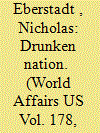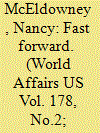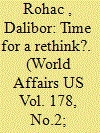|
|
|
Sort Order |
|
|
|
Items / Page
|
|
|
|
|
|
|
| Srl | Item |
| 1 |
ID:
139956


|
|
|
|
|
| Summary/Abstract |
In March, David Shambaugh, a professor at George Washington University, wrote a major essay for the Wall Street Journal titled “The Coming Chinese Crackup.” Shambaugh’s main point was that “the endgame of Chinese communist rule has now begun . . . and it has progressed further than many think.” Shambaugh admits that his view is not universally accepted, but the fact that a scholar of his reputation has reached this conclusion is significant.
|
|
|
|
|
|
|
|
|
|
|
|
|
|
|
|
| 2 |
ID:
139959


|
|
|
|
|
| Summary/Abstract |
A specter is haunting Europe. It has many names, and none of them fits. It is neither left nor right, and neither revolutionary nor reactionary, although it is a bit of all these things. It has many diverse and sometimes incongruous manifestations; it seems to spring from a single fountain of malaise and discontent.
|
|
|
|
|
|
|
|
|
|
|
|
|
|
|
|
| 3 |
ID:
139955


|
|
|
|
|
| Summary/Abstract |
A specter is haunting Russia today. It is not the specter of Communism—that ghost has been chained in the attic of the past—but rather of depopulation—a relentless, unremitting, and perhaps unstoppable depopulation. The mass deaths associated with the Communist era may be history, but another sort of mass death may have only just begun, as Russians practice what amounts to an ethnic self-cleansing.
|
|
|
|
|
|
|
|
|
|
|
|
|
|
|
|
| 4 |
ID:
139960


|
|
|
|
|
| Summary/Abstract |
When scanning the international scene today, it is tempting to see shadows of a dark past. Feudal powers annexing neighboring territories, maniacal cults perpetrating atrocities, pandemics threatening to wipe out entire societies—many of today’s top challenges have an eerie resemblance to upheavals of the medieval period. While there is indeed some validity to these parallels, they represent only a partial view of the extraordinarily complex realities unfolding in front of us. We face daunting challenges, to be sure, but we also face unprecedented opportunities for progress, as global poverty levels recede, access to education and medical care expand with the ranks of an international middle class, and technological advances put almost unlimited knowledge and influence into the hands of millions of individuals. Charting a way forward in the midst of this complexity—blunting threats to our security at home, seizing opportunities to advance our interests around the world, and working where possible to alleviate human suffering—is the task of American diplomacy. And if the world of tomorrow looks anything like what the trends of today suggest, effective diplomacy, and effective diplomats, will be more crucial to our national success than ever before.
|
|
|
|
|
|
|
|
|
|
|
|
|
|
|
|
| 5 |
ID:
139951


|
|
|
|
|
| Summary/Abstract |
The chattering class has spent months bickering about whether or not the United States should sign on to a nuclear deal with Iran, and everyone from the French and the Israelis to the Saudis has weighed in with “no” votes. Hardly anyone aside from the Saudis, however, seems to recognize that the Iranian government’s ultimate goal is regional hegemony and that its nuclear weapons program is simply a means to that end.
|
|
|
|
|
|
|
|
|
|
|
|
|
|
|
|
| 6 |
ID:
139952


|
|
|
|
|
| Summary/Abstract |
You can look at the jihadist murders of Jews in Brussels, Paris, and the Danish capital of Copenhagen over the past 12 months, and in Toulouse, in southern France, three years ago, and at the murder of Ilan Halimi in Paris in 2006, and conclude that Europe generally, and France in particular, has a problem with homicidal anti-Semitism.
|
|
|
|
|
|
|
|
|
|
|
|
|
|
|
|
| 7 |
ID:
139953


|
|
|
|
|
| Summary/Abstract |
As summer slowly unfolded in Washington in 2015, the global trade bill was tenuously moving forward after surviving more than one near-death experience. It is a syndrome as well as a legislative event: No global trade liberalization agreement has advanced beyond the aspirational stage since the Uruguay Round was completed more than 20 years ago, and the United States has managed to finish only one substantial regional agreement, the North American Free Trade Agreement (NAFTA), since 1994. There is a simple explanation for this indecisiveness and inaction: Trade liberalization is hard to sell to a skeptical public bombarded with populist fear of competition from a succession of low-wage countries, and political leaders have consistently failed to muster the political will to push agreements to completion.
|
|
|
|
|
|
|
|
|
|
|
|
|
|
|
|
| 8 |
ID:
139961


|
|
|
|
|
| Summary/Abstract |
Regardless of the party in power, libertarians are notoriously unhappy about US foreign and defense policy, skeptical of any active role that America can play in the world. Senator Rand Paul, for example, tried to formally end the US war in Iraq, proposed an end to military aid to Israel, and encouraged Americans to “fight back” against the National Security Agency’s invasion of their privacy. In 2011, he lambasted the intervention in Libya as unconstitutional, and questioned whether the US presence in Afghanistan was “vital to our national security interest.”
|
|
|
|
|
|
|
|
|
|
|
|
|
|
|
|
| 9 |
ID:
139958


|
|
|
|
|
| Summary/Abstract |
On January 5, 2015, in his first press conference of the new year, Japanese Prime Minister Shinzo Abe declared his country’s readiness to pursue a “proactive contribution to peace and stability” throughout the Indo-Pacific region. A phrase he had used a number of times since coming to power for the second time in 2012 (he used it again during his weeklong visit to the United States in April), it was code for Abe’s determination to change the insularity and timidity that has characterized Japanese strategic thinking since the end of World War II. Making the country more “proactive” is a policy Abe cannot push too forcefully. According to domestic polls, the Japanese people support and oppose in more or less equal numbers a more assertive identity for the nation. Such a reinvigorated Japan is also controversial in Tokyo’s strategic neighborhood—welcomed by all major Southeast Asian states, Australia, and India, but condemned harshly by China and North Korea, and viewed with suspicion by South Korea.
|
|
|
|
|
|
|
|
|
|
|
|
|
|
|
|
| 10 |
ID:
139957


|
|
|
|
|
| Summary/Abstract |
Why has the right, including the populist right, rather than the left, been the main political beneficiary of the anger and bitterness that has roiled Europe since the 2008 financial crash, the eurozone crisis, and the resulting deep recession and brutal austerity? After all, these events surely proved the relevance of the left’s critique of capitalism. The crisis has been so deep and prolonged that a kind of social disintegration has been taking place, at least in the Southern cone, without precedent in postwar Europe. (In Spain, youth unemployment is more than 55 percent.) More: the crisis has been managed largely to the benefit of the already well-off, in a spectacularly brazen fashion. The trillions that were handed over to banks too big to fail are now being gouged out of citizens too weak to resist. (This intensely political class strategy is called “austerity.”) The recovery, such as it is, is benefitting almost exclusively the already affluent, as catalogued in Danny Dorling’s cry of moral outrage, Inequality and the 1%. It is a recovery of McJobs, zero-hour contracts, and food banks. One UK charity alone, the Trussell Trust, has handed out 913,000 food parcels in the last year, up from 347,000 the year before.
|
|
|
|
|
|
|
|
|
|
|
|
|
|
|
|
|
|
|
|
|